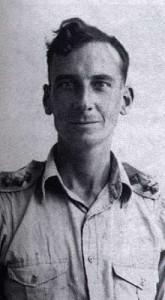Concerning all acts of initiative (and creation) there is one elementary truth, the ignorance of which kills countless ideas and splendid plans: that the moment one definitely commits oneself, then providence moves too. All sorts of things occur to help one that would not otherwise have occurred. A whole stream of events issues from the decision, raising in one’s favour all manner of unforeseen incidents and meetings and material assistance which no man would have dreamed would come his way. I have learned a deep respect for one of Goethe’s couplets: “Whatever you can do, or dream you can, begin it. Boldness has genius, magic, and power in it. Begin it now.”
W. H. Murray, The Scottish Himalayan Expedition
From Wikipedia
 “At the outbreak of World War II, he (W. H. Murray) joined the Argyll and Sutherland Highlanders and was posted to the Middle East and North Africa. He was captured south of Mersa Matruh during the Western Desert Campaign in a retreat to El Alamein in June 1942 by a tank commander from the 15th Panzer Division who was armed with a machine-pistol. A passage in Mountain magazine (#67, 1979) describes the moments after his capture:
“At the outbreak of World War II, he (W. H. Murray) joined the Argyll and Sutherland Highlanders and was posted to the Middle East and North Africa. He was captured south of Mersa Matruh during the Western Desert Campaign in a retreat to El Alamein in June 1942 by a tank commander from the 15th Panzer Division who was armed with a machine-pistol. A passage in Mountain magazine (#67, 1979) describes the moments after his capture:
- To my astonishment, he [the German tank commander] forced a wry smile and asked in English, ‘Aren’t you feeling the cold?’ … I replied ‘cold as a mountain top’. He looked at me, and his eyes brightened. ‘Do you mean – you climb mountains?’ He was a mountaineer. We both relaxed. He stuffed his gun away. After a few quick words – the Alps, Scotland, rock and ice – he could not do enough for me.
Murray then spent three years in prisoner of war camps in Italy (Chieti), Germany (Moosberg, Brunswick) and Czechoslovakia (Marisch Trubeau Oflag VIII-F). While imprisoned, Murray wrote a book entitled Mountaineering in Scotland. The first draft of the work was written on the only paper available to him — rough toilet paper. The manuscript was found and destroyed by the Gestapo. To the incredulity of his fellow prisoners, Murray’s response to the loss was to start again, despite the risk of its loss and that his physical condition was so poor from the near starvation diet that he believed he would never climb again. The rewritten work was finally published in 1947 and was followed by the sequel, Undiscovered Scotland, in 1951. Both concentrate on Scottish winter climbing and were widely credited with helping to inspire the post-war renaissance in the sport. Though written in an evocative, rather pantheistic, style, somewhat too romantic for modern tastes, they are of significant literary value.”
[color-box color=”gray”]
What’s A Life’s Work about? It’s a documentary about people engaged in projects they won’t see completed in their lifetimes. You can find out more on this page.
We recently ran a crowdfunding campaign and raised enough to pay an animator and license half of the archival footage the film requires. We need just a bit more to pay for licensing the other half of the archival footage, sound mixing, color correction, E&O insurance and a bunch of smaller things. When that’s done, the film is done! It’s really very VERY close!
So here’s how you can help get this film out to the world. It’s very simple: click the button…
Donate Now!
… and enter the amount you want to contribute (as little as $5, as much as $50,000) and the other specifics. That’s it. No login or registration required. Your contribution does not line my pocket; because the film is fiscally sponsored by the New York Foundation for the Arts, all money given this way is overseen by them and is guaranteed to go toward the completion of this film. Being fiscally sponsored also means that your contribution is tax-deductible. So why not do it? The amount doesn’t matter as much as the fact that you’re helping to bring a work of art into the world. And that, I think, is really exciting!
Questions? Email me at d a v i d ( aT } b l o o d o r a n g e f i l m s {d o t] c o m[/color-box]
